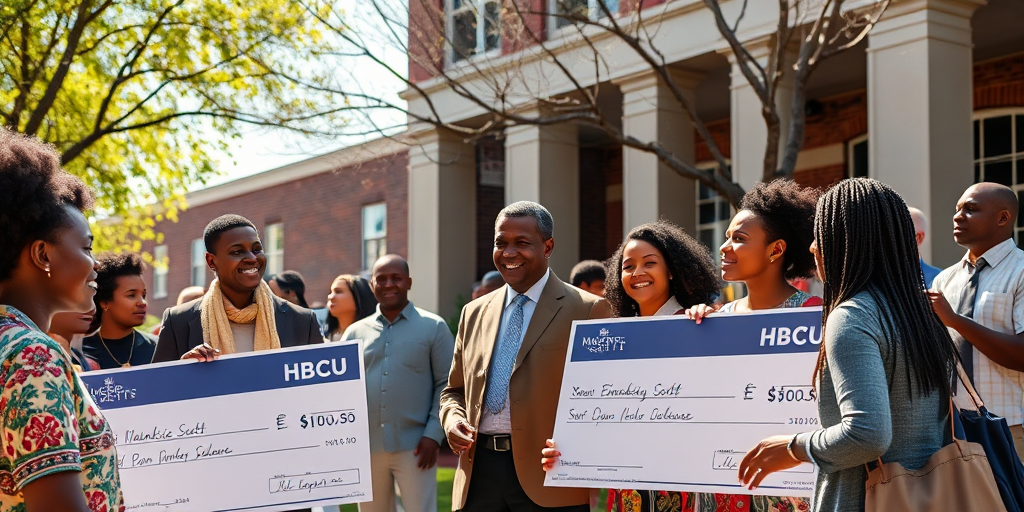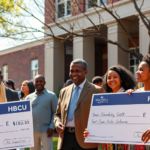**MacKenzie Scott’s Billion-Dollar Defiance: Uplifting Black Education Amid Diversity Challenges**
Philanthropist MacKenzie Scott has once again made waves with her remarkable financial contributions to historically Black colleges and universities (HBCUs), earmarking over $400 million this year alone. This substantial figure reflects more than generosity; it is a strategic stand against the ongoing struggles surrounding diversity in American education and the neglect of institutions that primarily serve Black communities.
**A Transformative Influence on HBCUs**
Scott’s funding, the largest ever received by several HBCUs, aims to fuel scholarships, advance research capabilities, and bolster pivotal academic programs. The goal is clear: supporting the education of Black students, ensuring their empowerment, and fostering a well-educated Black citizenry capable of making significant societal contributions.
Key beneficiaries of Scott’s largesse, such as Prairie View A and M University and Howard University, have outlined ambitious plans for utilizing these funds. Prairie View A and M University, with a $63 million donation, intends to expand its research and academic programs in vital fields like artificial intelligence and public health. Howard University, having received an $80 million gift, plans to enhance student aid, infrastructure, and research initiatives.
**Contextualizing Scott’s Philanthropy**
This philanthropic momentum is especially poignant in light of the current socio-political atmosphere, where efforts to downplay diversity and diminish the narratives of Black history and scholarship are routinely attempted. Various state-level actions to limit the teaching of critical race theory and related subjects mirror broader attempts to sanitize educational content, erasing the contributions of Black and female leaders from the narrative.
Against this backdrop, Scott’s gifts serve as not just financial support but as an endorsement of diversity and inclusion in academia. Her involvement helps combat the financial neglect often faced by HBCUs and secures resources that allow these institutions to thrive despite external pressures.
**Local Impact of Scott’s Gifts**
Within communities poised to benefit from this influx, the sense of optimism is palpable. For local residents, particularly in areas closely tied to HBCUs, Scott’s contributions represent a surge of opportunity for future generations. University leaders emphasize how these funds will not only enhance educational structures but will also empower local economies through job creation and community engagement initiatives tied to university expansions.
Bowie State University’s President Aminta Breaux expressed gratitude for the historic $50 million grant, highlighting the transformative potential it holds. “This gift empowers us to expand access and uplift generations of students who will lead, serve, and innovate,” she said, reflecting the wider sentiment of hope and progress that accompanies such investments.
**Aligning with the Black Press’s Mission**
Scott’s efforts also align with the long-standing mission of the Black Press, dedicated to preserving and amplifying Black life narratives in the face of marginalization. The Black Press, known for chronicling the Black American experience, finds a kinship in Scott’s commitment to storytelling through education, capturing the essence of resilience and potential epitomized by HBCUs.
**Future Implications and Broader Patterns of Philanthropy**
Looking ahead, Scott’s substantial donations may stimulate similar philanthropic actions, encouraging other affluent individuals to support neglected communities and education sectors. Her contributions join those of prominent philanthropists like Melinda French Gates, who dedicates resources to empower women and girls globally. Such aligned philanthropic initiatives reflect a broader pattern of using immense financial power to push back against societal inequities.
While this wave of giving brings clear advantages, it also opens a dialogue on the sustainability and long-term impacts of such donations. Balancing these gifts with coordinated funding strategies will be crucial to ensure that HBCUs not only receive the needed boost now but continue to thrive independently.
**Community Resources and Participation Opportunities**
For community members looking to contribute to or learn more about the potential impacts of these donations, local universities and community centers plan to offer informational sessions. Engaging with these resources provides avenues for dialogue and broader community involvement in shaping the future direction of educational institutions in the area.
In conclusion, MacKenzie Scott’s significant contributions represent a beacon of hope and a stand against adverse forces in the education sector. They exemplify the power of philanthropy to catalyze change and reaffirm the importance of diversity and inclusion as cornerstones of a robust educational system that empowers all citizens.







